
LA PAZ, Jul 12 (IPS) – They haul many kilos of recyclable materials on their backs but receive little in return. These Bolivian women who help clean up the environment from dawn to dusk are fighting for recognition of their work and social and labor rights.
The inhabitants of La Paz, Bolivia’s political center, walk hurriedly and almost oblivious to the women of different ages silently opening heavy lids of municipal garbage dumpsters that are taller than the women themselves.
They use a homemade tool, a kind of hook with a long wooden handle, to dig through the unsorted waste, trying to avoid getting cut by broken glass, and in search of plastic containers, paper, cardboard or aluminum cans.
People walk by on the avenues and squares without looking at them, and sometimes actively avoiding them. The recyclers feel this indifference and even rejection, but they overcome it with the courage gained over years and generations, convincing themselves that they have a dignified vocation.
“People call us dirty pigs (cochinas), they humiliate us and we can never respond,” says Rosario Ramos, a 16-year-old who accompanies her mother, Valeriana Chacolla, 58, sorting through the trash for recyclable waste.
A study by the United Nations Joint Program on self-employed women workers in the country describes them generally as being “of indigenous origin, adults with primary school education. Seventy percent of them are also involved in activities related to commerce, while 16 percent work in the manufacturing industry.”
Of a population of 12.2 million projected by the National Institute of Statistics for the year 2022, 5.9 million are women. La Paz is home to 1.53 million people.
Of the total population of this Andean country, 41 percent defined themselves as indigenous in the last census, while according to the latest official data available, 26 percent of urban dwellers live in moderate poverty and 7.2 percent in extreme poverty, including most of the informal recyclers.
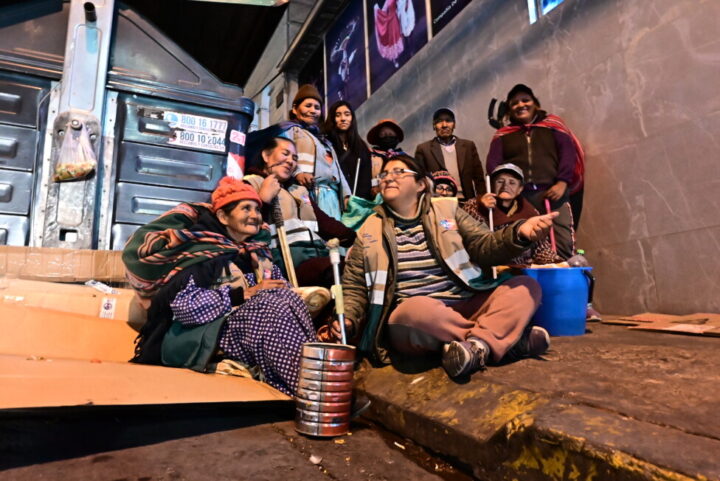
On this southern hemisphere wintertime July night in La Paz, the group of women are virtually invisible as they gather around the dumpsters located in a corner of the Plaza Avaroa, in the area of Sopocachi, where residential and public office buildings are interspersed with banks, supermarkets and other businesses.
It’s a good place for picking through the waste in the dumpsters, and the women find paper, newspapers, plastic and aluminum containers. Although the volume of waste is large, each one of the garbage pickers manages to collect no more than one or two kg on one of the days that IPS accompanied different groups of the women in their work.
The silence is broken on some occasions when salaried municipal cleaners show up and throw the women out of the place, because they also compete to obtain materials that they then sell to recyclers. This is a moment when it becomes especially clear that garbage has value.
That is one of several reasons that forced the informal garbage pickers to come together in an association called EcoRecicladoras de La Paz. “There is no work for us, and they only listen to us when we organize,” says María Martínez, 50, the recording secretary of the 45 members, who also include a few men.
In Bolivia, trash is not separated into reusable and non-reusable waste in homes or offices. This task is carried out by private recycling companies, who buy the raw materials from informal waste collectors such as EcoRecicladoras.
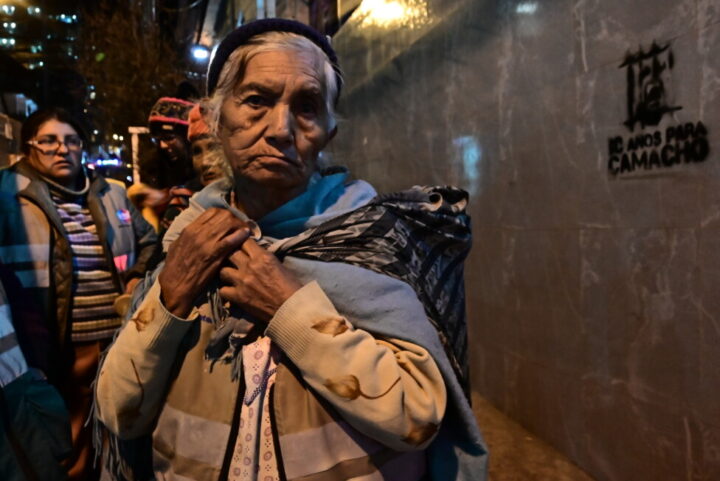
Martínez, with slightly graying hair, says she comes out every evening. “I was a domestic worker until I was 30 years old. When my daughter was born I couldn’t get a job. I collected plastic bottles, clothes and shoes and sold them to the factories, but the recycling companies who pay really low prices emerged,” she complains.
It takes about three months between the initial collection and the final sale of the recyclable materials. Martínez collects the materials, carries around seven kg on her back, walks about three kilometers and patiently stores them until she has enough to sell them to the wholesaler.
“One year I collected 200 kg of scrap metal and sold it for 150 bolivianos (about 20 dollars),” she recalls. The recycling companies want to buy by the ton, she explains, with a grin, because it is impossible for them to reach that volume.
She represents a second generation of garbage collectors. Her mother, Leonor Colque, is two years short of turning 80, and has been combing through garbage dumps and trash on the streets for 40 years. On her back she carries a cloth in which she hauls a number of pieces of paper and some plastic waste.
“They should stay in school because this job is not for young girls,” she recommends, sadly, because she could not achieve her goal of sending one of her daughters to a teacher training school.
At 58, Chacolla, like almost all women garbage pickers, is the head of her household. Her husband, a former public transport driver, lost his job due to health problems and occasionally works as a welder, door-maker or bricklayer.
When she goes out to sort through trash she is accompanied by her daughter, Rosario, who explains and expands on what her mother says, calling for a change in the public’s attitude towards them and respect for the work they do as dignified, emphasizing, as they all do, that they deal with recyclable waste, not garbage.
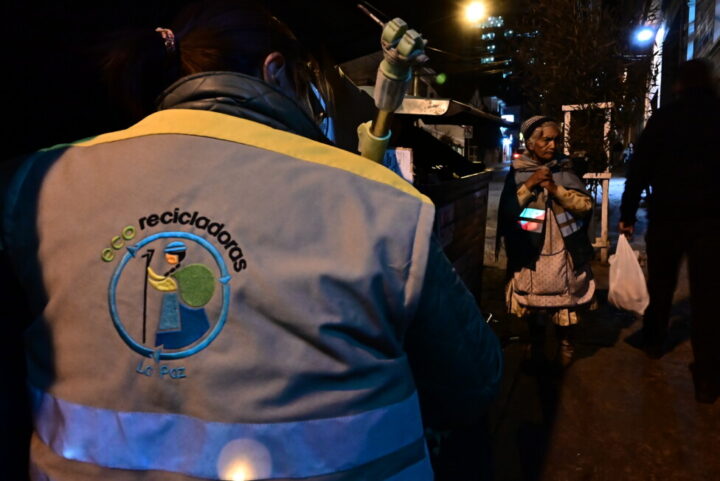
“I walk with the Lord in my heart, he always helps me,” says Angelica Yana, who at 63 years of age defies the dangers of the wee hours of the morning in the Achachicala area, on the outskirts of La Paz, five kilometers north of the city.
“Nothing has ever happened to me,” says Yana, who leaves her home at three in the morning to scrape up enough to support a son who offers fine finishing masonry services, and her sick husband.
At the age of 70, Alberta Caisana says that she was assaulted by municipal cleanup workers while she was scrounging for recyclable materials. She now carries a credential issued by the Environmental Prevention and Control Directorate of the Autonomous Municipal Government of La Paz, and wears a work vest donated by development aid agencies from the governments of Sweden and Switzerland.
She relies on her uniform and identification card as symbols of protection from the indifference of the people and aggression from local officials.
The mother of a daughter and the head of her household, Anahí Lovera, saw her wish to continue her university studies frustrated, and at the age of 32 she combines collecting plastic bottles with helping in different tasks in the construction of houses.
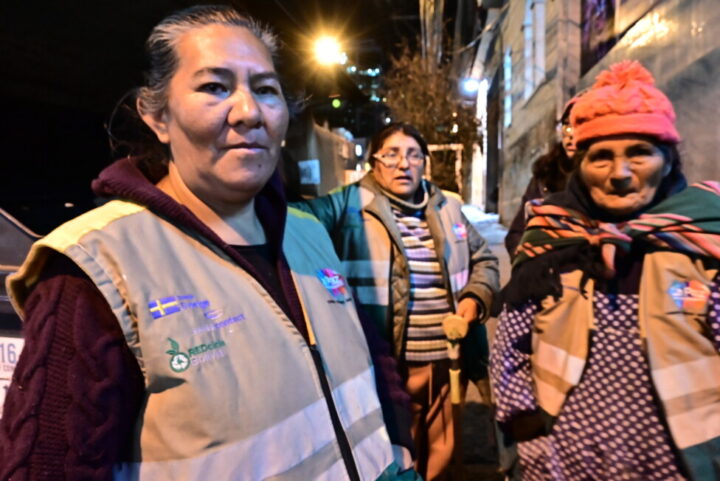
Others, they say, sell clothes and other recovered objects in street markets, such as the famous one in Villa 16 de Julio in the neighboring city of El Alto, where used and new objects are sold in an area covering two kilometers.
Lovera’s work appears to go smoothly, but she and her colleagues describe the moment of dealing with the buyers. They deliver an exact volume and weight of products and the buyers declare a lower weight in order to pay less.
“This sector isn’t noticed by society, especially because we work with waste, that is, with what society throws away; this work is ‘devalued’,” Bárbara Giavarini, coordinator of Redcicla Bolivia-Reciclaje Inclusivo, told IPS.
One sign of the public’s recognition of the “grassroots recyclers,” as they call themselves, could be the direct, sorted delivery of the waste, which would facilitate the women’s work, she said.
Redcicla, a platform that promotes the integrated treatment of waste, has been helping since 2017 to organize them and bring visibility to their work, while fostering the delivery of waste from citizens to “grassroots recyclers” and working for the recognition of their work as dignified.
The president of Ecorecicladoras de La Paz, Sofía Quispe, supports the idea of getting help from local residents in sorting materials and delivering them to their affiliates, instead of throwing them into dumpsters where they are mixed with products that prevent subsequent recycling.
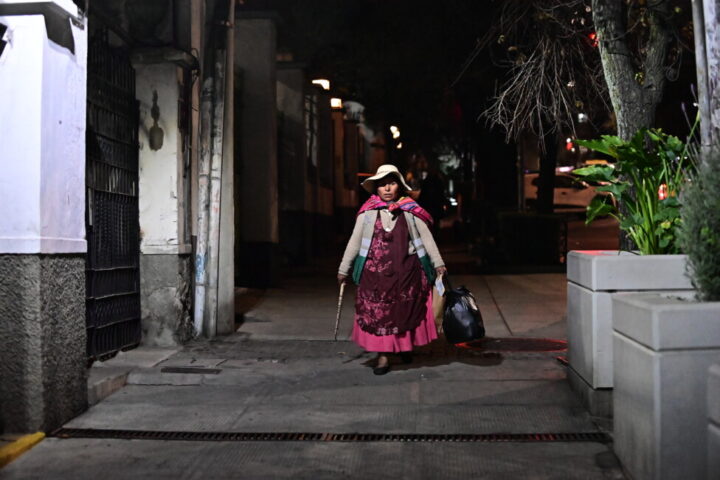
Quispe is a 42-year-old mother of three. Like most of her fellow recyclers, she walks about two kilometers on foot in search of dumpsters, dressed in the customary indigenous wide-brimmed hat and pollera or skirt.
On the night that IPS accompanied her, she did not find the dumpster that was usually on Avenida 6 de Agosto, probably because it had been removed and taken to another part of the city.
The impoverished garbage picker was once a skilled seamstress who worked in small family-owned factories in the Brazilian city of São Paulo. Upon her return due to an illness, she was unable to raise the money she needed to buy a machine and raw materials.
She was also discouraged by the lack of interest among local residents in buying garments made in Bolivia, as they preferred low-cost clothing smuggled into the country as contraband.
Leonarda Chávez, another 72-year-old head of household, who collects recyclable materials every day with her daughter Carla Chávez (42) and granddaughter Maya Muga Chávez (25), feels satisfied because she can see her dream come true.
This month, her granddaughter earned a diploma in Business Social Responsibility, with which she completed her university education, in addition to a degree in commercial engineering and business administration, in a country where higher studies do not always guarantee good jobs.
Among the darkness and the objects discarded by people, hope is also alive. Rosario Ramos took the lessons of hard work and created her own goal: “I will study advanced robotics and prosthetic assembly,” she says with a confidence that contrasts with the group’s sad stories.
© Inter Press Service (2023) — All Rights ReservedOriginal source: Inter Press Service

